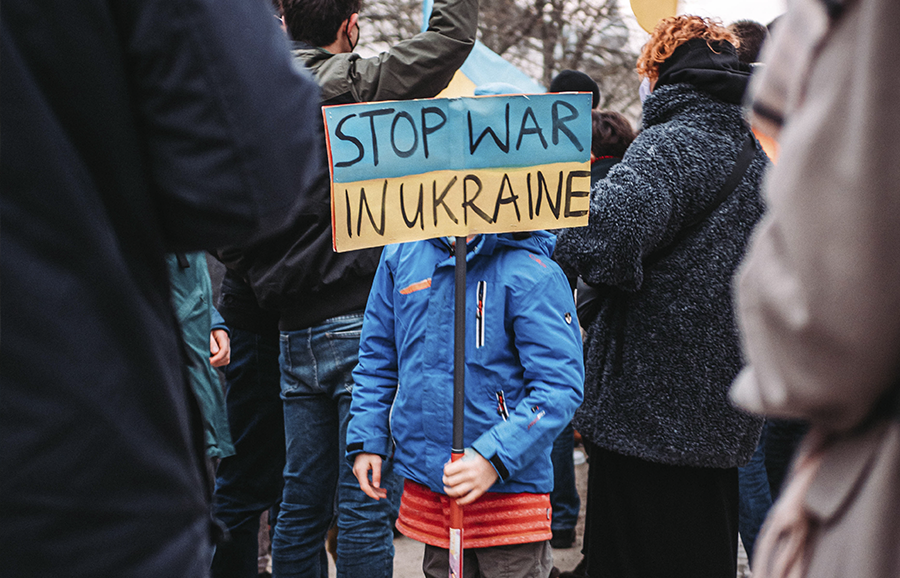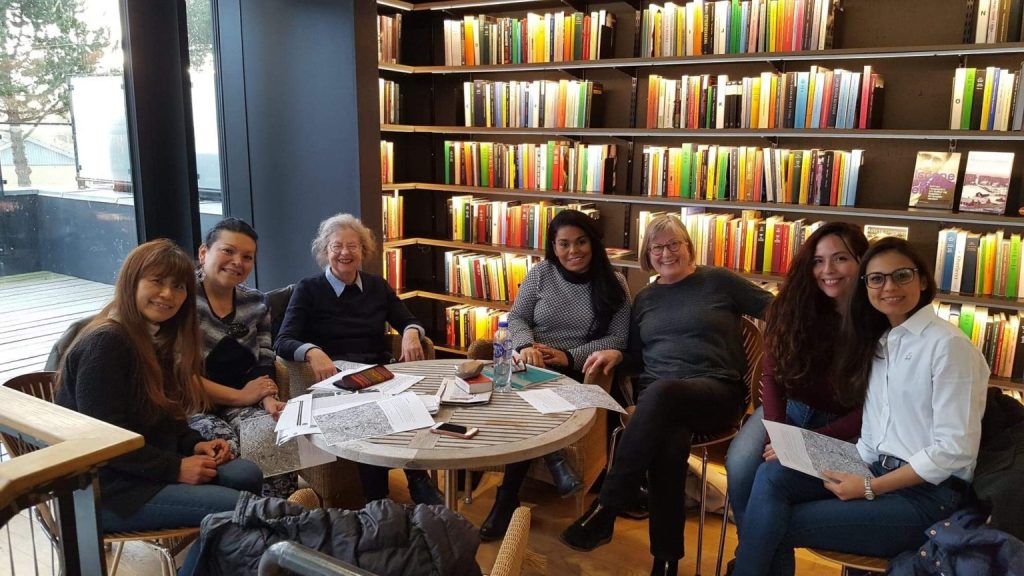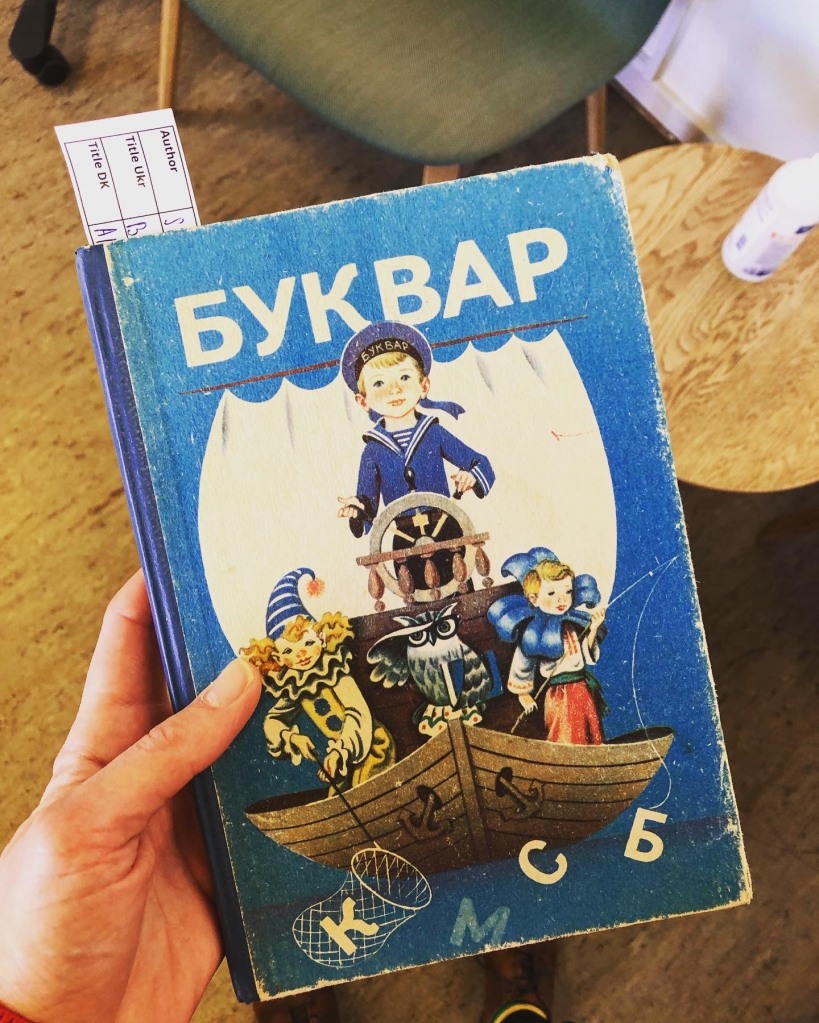
This is a blog post on how libraries can help and be engaged in the Ukrainian conflict. It will be updated continuously.
”The first casualty when war comes is truth”.
So said US Senator Hiram Warren Johnson in 1918 and I think he makes a strong point, which is still extremely relevant in 2022. With the Russian invasion of Ukraine in February 2022 we have been thrown into a period of war, uncertainty, missiles hitting innocent targets and propaganda war machine scorched-earth strategies trying to challenge and destroy facts and create new versions of the truth. Not at least, the invasion has been followed by loss of civilian life’s and made millions of Ukrainians flee their homes.
Libraries has always been means in creating stronger communities and a better world and across the world libraries are playing an active role in the conflict helping those in need.
For inspiration to libraries who want to support and help I’ve collected some examples on how libraries are being engaged in the conflict helping victims, refugees and securing knowledge and information about the war. If you know of any activities that should be shared please write them in the commentary. Thanks to everyone who already shared thoughts and activities in this Twitter thread
Helping refugees
As writing this almost 3 million Ukrainians has left Ukraine and are now refugees in a number of countries. As trusted shared community places libraries have an important range of options to help refugees in the local areas.
Providing shelter and places to be
Libraries are havens in the community and some has opened their doors as temporary places for refugees. Wrocław Minicipality Branch Library in Poland is an example
Many libraries are also reaching out to refugees inviting them in for relevant activities at the library. See examples of this in the ‘Activities for refugees’ section.
Libraries and library workers raising money and aid
Many libraries host local fairs selling books and stuff donated from the community in order to raise money helping refugees. Others are giving library workers paid leave to volunteer helping refugees:
At Roskilde Libraries we had an employee who travelled to Poland to help refugees at the boarder to Ukraine and co-workers helped collecting medicine, warm socks, money and other relevant things to ease the situation at the boarder.
Activities for refugees
Libraries has a wide range of core activates that with some adjustments can be extremely relevant for Ukrainian refugees coming to a community.
Language cafe’s
Many libraries has Language Café’s as a permanent activity in the work with integration of new citizens. A Language Café is a place where people who don’t speak the local language can come and learn and practice it with fellow citizens. They take place at the library and is often driven by volunteers together with the library. Besides learning a language, they often serves a great way into local networks in the community.
A relevant way to get around volunteers who can bridge the Ukrainian language and the local language is to reach out to local Ukrainian community organizations.

IT and homework help
In the same alley as Language Café’s many libraries provides help with IT and homework for kids. The web and IT landscape might look different in the local context than in Ukraine and it is a big help for many refugees to get assistance with this. At the same time it is important, that Ukrainian children can be connected with education and school at some level. Weekly Homework Café’s which provides assistance to school work and local network is a big help in this.
Collecting and promoting literature in Ukrainian
Not many libraries outside Ukraine holds large volumes of literature in Ukrainian but many efforts is being done to collect and promote reading in Ukrainian to refugees. Also when the language is a barrier promoting picture books with no words is a great option – especially towards children.
At Roskilde Libraries we are collaborating with the local Ukrainian Community Organization who has donated 250 – 300 titles in Ukrainian what we are making accessible and promoting to refugees through our library system. Alongside the national body of The Danish Digital Library is working on making vendor deals creating free access to digital literature in Ukrainian.

A gateway to a new country and system
Every country has it’s own state and municipality system which are different than the one you come from – housing, banks, day care, schools and all those things that can be difficult to get around for everybody coming to a new place and even more when you are in a valuable and terrible situation as a refugee having to leave your home. Many libraries are offering assistance and guidance both personal and via online resources to help Ukrainian refugees get as good a start as possible in the new place and system.
Connecting with the local community
Libraries are about community and I’m thrilled to see libraries create programs that aims at connecting Ukrainians with the local community; Board game nights, dinners, reading clubs, LEGO programs for kids and a lot of great, free and wholehearted programs that helps people connect.
Activities with fellow refugees
Alongside activities to connect Ukrainians with the local community many libraries also make programs and events just for refugees; Coming to a safe and trusted places just to meet with people in a common situation, helping each other out, sharing experiences with the new country is extremely valuable for many and the library is the perfect place for this.
Engaging the community in helping
Thankfully many people want to help and contribute in this terrible situation. But that are your options and how do you help the best way? Libraries are gathering information on how to help and connecting with relevant organization on their web sites and are hosting community meetings to inform and connect.
Valid information about the conflict
The truth is always vulnerable in a conflict like this and many parties has an interest in spreading fake news and misinformation about the conflict – libraries has an important role in fighting this:
Collecting valid information resources about the conflict
Libraries are collecting and promoting valid information and facts about the conflict and the background and are also pointing out sources of obvious misinformation.
How to talk to you children about a war
War is scary and brings a lot of uncertainty – especially for children who often meets fragments of the war in pictures, headlines, news and by talking to their friends. It can be difficult for many parents to talk to their children about something like a war and many libraries are promoting resources on this important subject.
Raising awareness, engagement and creating debate
A war and conflict is far more complex than the daily headlines and key figures on refugees, casualties etc. As a democratic and trustworthy cornerstone in the community, libraries are a great platform for raising awareness, engagement and debate about something, that is difficult and has many facets and aspects to uncover in order to understand and help.
More inspiration
Here are some links to other sites writing about what libraries can do to help Ukraine
EBLIDA – Libraries for Ukraine
COSEELIS – Libraries helping Ukraine
East Anglia – Libraries and the war in Ukraine
NPR – Ukraine’s libraries are offering bomb shelters, camouflage classes and, yes, books

[…] library lab erklärt, wie Bibliotheken der Ukraine helfen können, indem Sie Flüchtlinge und die Gemeinschaft unterstütz… (via Newslet for libraries ISSUE 189, 29 MAR […]
LikeLike
[…] Christian, How libraries can help and support Ukraine, refugees and communities, LibraryLab […]
LikeLike